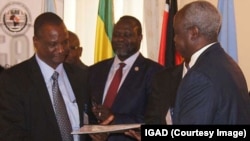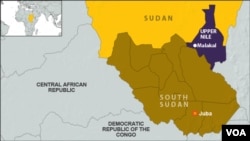The warring sides in South Sudan have committed once again to abide by a months-old cessation of hostilities agreement brokered by regional bloc, the Intergovernmental Authority on Development (IGAD).
"The Parties commit to an unconditional, complete and immediate end to all hostilities, and to bring the war to an end," IGAD said in a resolution reached after an extraordinary summit, focussed on the ongoing conflict in South Sudan.
The resolution threatens to impose targeted sanctions and stop supplying arms to anyone who breaks the ceasefire deal, which was signed on November 9.
IGAD also warned that it will "directly intervene in South Sudan to protect life and restore peace and stability" if there is another ceasefire breach. IGAD intervention in South Sudan would not require prior discussion with the country's authorities, the resolution says.
If IGAD is forced to take punitive measures against one or the other side in South Sudan, it will seek backing to enforce those measures from the African Union, the U.N. Security council and "the entire international community," it says.
Transitional government
IGAD also gave the two sides 15 days to firm up the details of a transitional government for South Sudan.
The chief opposition negotiator at peace talks being held in Ethiopia, Taban Deng Gai, told reporters that the rebels agreed that President Salva Kiir should lead a transitional government, and opposition leader Riek Machar should serve as prime minister. The position of prime minister would be a new one in South Sudan, created for the transitional government.
The rebels rejected three other proposed posts -- of vice president and two deputy prime ministers.
"The government is proposing that the leadership of the transitional government be president, vice president, prime minister and two deputies to the prime minister," said Taban Deng Gai, the opposition's led negotiator. "This... will lead to confusion. Too many cooks will spoil the broth."
Deng said the opposition is not prepared to make any more concessions to the government as the two sides hammer out the details of the transitional government.
"The government is proposing that the leadership of the transitional government be president, vice president, prime minister and two deputies to the prime minister. This will lead to confusion. Too many cooks will spoil the broth.Taban Deng Gai
"We have made a bold, bold move for us to accept Salva Kiir to be the president in the interim period and for him to lead the nation and for him also to share the Council of Ministers," he said.
"This means that we have given him everything - he is now the head of the state and the head of government. We have nothing more to concede."
Skepticism
The cessation of hostilities was violated almost immediately after it was signed in late January. It has been recommitted to three times since then, but has never taken hold.
Nhial Tiitmamer, an analyst from the Juba-based Sudd Institute think-tank, urged the warring sides this time to put their words into action and commit to the latest peace deal. Only when the people of South Sudan see that there is no fighting will they set aside their skepticism that the government and rebels are committed to peace.
"You believe something when you know the previous promise took place... So this time around, we can't wait until things are done," he said.
New clashes reported
But within days of the signing of the latest deal, new fighting was reported in Upper Nile state.
SPLA spokesman Philip Aguer said government positions in Dukduk, in northern Upper Nile near the border with Sudan, came under rebel attack early Monday.
Aguer said five SPLA soldiers and at least 24 rebel fighters were killed in the clashes.
The rebels, meanwhile, laid the blame for the attack squarely with the SPLA.
"The government is entirely responsible for these unnecessary attacks motivated by its desires and attempts to recapture oil fields under our control before a permanent cessation agreement could be signed," the rebels' military spokesman, Lul Ruai Koang, said in a statement.
Michael Atit, Charlton Doki and Karin Zeitvogel contributed to this report.





